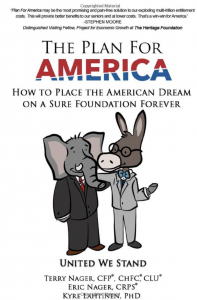Plan for America can guarantee retirement benefits and lifetime health care, say, founders.
A non-profit group of financial professionals at a national conference at Principia College in Elsah, Illinois, said their voluntary private savings plan could protect Social Security and Medicare from insolvency, and solve the issue of runaway health care spending.
The organizers of Plan for America (PFA) say the purpose of the April 28, 2023 meeting was to get the word out about the savings plan and raise awareness of the shortfalls facing the nation’s entitlement programs. The confab was live-streamed and recorded, and featured panel discussions on Social Security, the national debt and federal budget deficit, and health care.
PFA proposes Congress and the states contractually create a trust into which individuals could direct their payroll taxes and other earnings in accounts that would guarantee lifetime health care and retirement income. Because it provides health care, the plan could relieve states of their Medicaid obligations. The trust could eliminate the programs’ more than $100 trillion in estimated unfunded liabilities between 2059 and 2079, PFA says.
The panelists included Terry Nager and Eric Nager, two of the three authors of the plan; John Goodman, an economist and co-publisher of Health Care News; Stephen Moore, a senior economist with FreedomWorks; Daniel Smith, a professor of economics at Middle Tennessee State University; and AnneMarie Schieber, managing editor of Health Care News. Social Security and Medicare will be insolvent in a few years, requiring higher taxes or benefit cuts, according to officials and analysts.
Flawed System
The federal programs for retirees have a basic flaw, Goodman told the audience.
“What we have is a pay-as-you-go (PAYGO) system,” said Goodman. “Nothing is saved, nothing is invested. If you are receiving Social Security, it’s being paid for by younger workers because there is no other source of funds.”
PAYGO financing means that succeeding generations of workers have to consent to pay taxes for the benefit of retirees, Smith told the audience.
“We’re relying on a politician’s promise that a future politician that we don’t even know is going to tax other people to fund that promise,” said Smith. “That’s insane and people take that to the bank.”
A funded retirement system could have been implemented a generation ago, Moore told the audience.
“The tragedy is if we had done this (privatize entitlements) when Bill Clinton started talking about it, young people—every millennial—would retire a millionaire,” said Moore. “You’re getting no return for your Social Security money. It’s the biggest rip-off in your life.”
Guaranteed Benefits
The PFA proposal, which is described on its website and detailed in a book, would give workers the option to divert their payroll taxes into the For American Security Trust (FAST).
The FAST would administer and invest in a total market index fund of U.S.-domiciled companies and use the power of compound interest to provide benefits and retirement income. Participants would own their accounts, which could be passed on to heirs upon death. The FAST would guarantee, at a minimum, the Social Security benefits promised today.
Today’s retirees could participate in the plan and, if they choose to remain in Social Security, could create an account as an alternative to Medicare.

Lifetime Health Coverage
Workers would use their FAST accounts to purchase health insurance that would offer a comprehensive plan for a standard individual premium of $11,200 that would include a $1,200 health savings account.
Low-income earners could pay for their health insurance with interest-free loans tied to a life insurance policy and later paid back from the account.
Eric Nager presented an example to the audience of how a single mother over 40 years old who earns no more than $25,000 in her lifetime could get at least the amount promised her ($14,676 annually) by Social Security. If the stock market averages an annual rate of return of 10.2 percent over the 40 years, she could get a payout of $45,363 a year when she retires, and would still be better off financially after paying off the interest-free loans for health care than if she had stayed in Social Security.
“The choice (to participate) should be a no-brainer,” said Nager.
Health Insurance Package
Terry Nager (Eric’s brother) told the audience it is important to include health care in the plan, but participation would be voluntary.
Private insurers could charge less than the standard premium to compete against one another, but could not turn down coverage for any reason, said Nager.
“What we want is a standard of care, how they package it is up to them,” said Nager.
FAST account holders could opt out of health care but would have to place $100,000 in escrow to cover an unforeseen health event.
“Nobody pays for someone else’s care,” said Nager.
Game Changer
Jim Stock, a small business owner, traveled from Jacksonville, Florida to attend the conference in person.
“I had read the part of the book and understood the basic concept but (it wasn’t) until they drilled it down at the conference that I realized—wow, there is no reason why this can’t work,” said Stock.
People will have to have the will to push the plan forward, says Stock.
“I’m an optimist by nature,” said Stock. “I believe even with this debt culture that people do have the ability to self-correct. Politicians need to be honest about these programs and voters have to support them even if they say something no one wants to hear.”
Jeff Scott watched the live stream, and has shared PFA with close friends and the support has been heartening.
“I’ve heard a lot of people talk about health care over the years, and this is the first plan that has started to make sense,” said Scott.
“We still need to come to grips with costs so that there is some transparency. We’ll need to get Congress to focus on fiscal solutions for voters/citizens and get out of the pockets of special interests like insurance companies and hospital groups. But Plan For America is a start. We’ll need bipartisan political support too, but I am optimistic! I hope we can get something done in my lifetime.”
John O’Melveny Woods, an author, publisher, and filmmaker, attended the conference online to learn how the plan could fix Social Security’s problems.
“I realized, after listening to the Plan for America, that there is a way out of this quagmire if only both political parties have the will and fortitude to take the steps necessary to implement it. I found it cogent, well presented, and, most especially, hopeful,” said Woods.
PLA is planning future conferences and is recruiting actuaries to review their projections.
AnneMarie Schieber (amschieber@heartland.org) is the managing editor of Health Care News.
Internet info:
Plan for American Conference, Principia College, April 28, 2023:





















